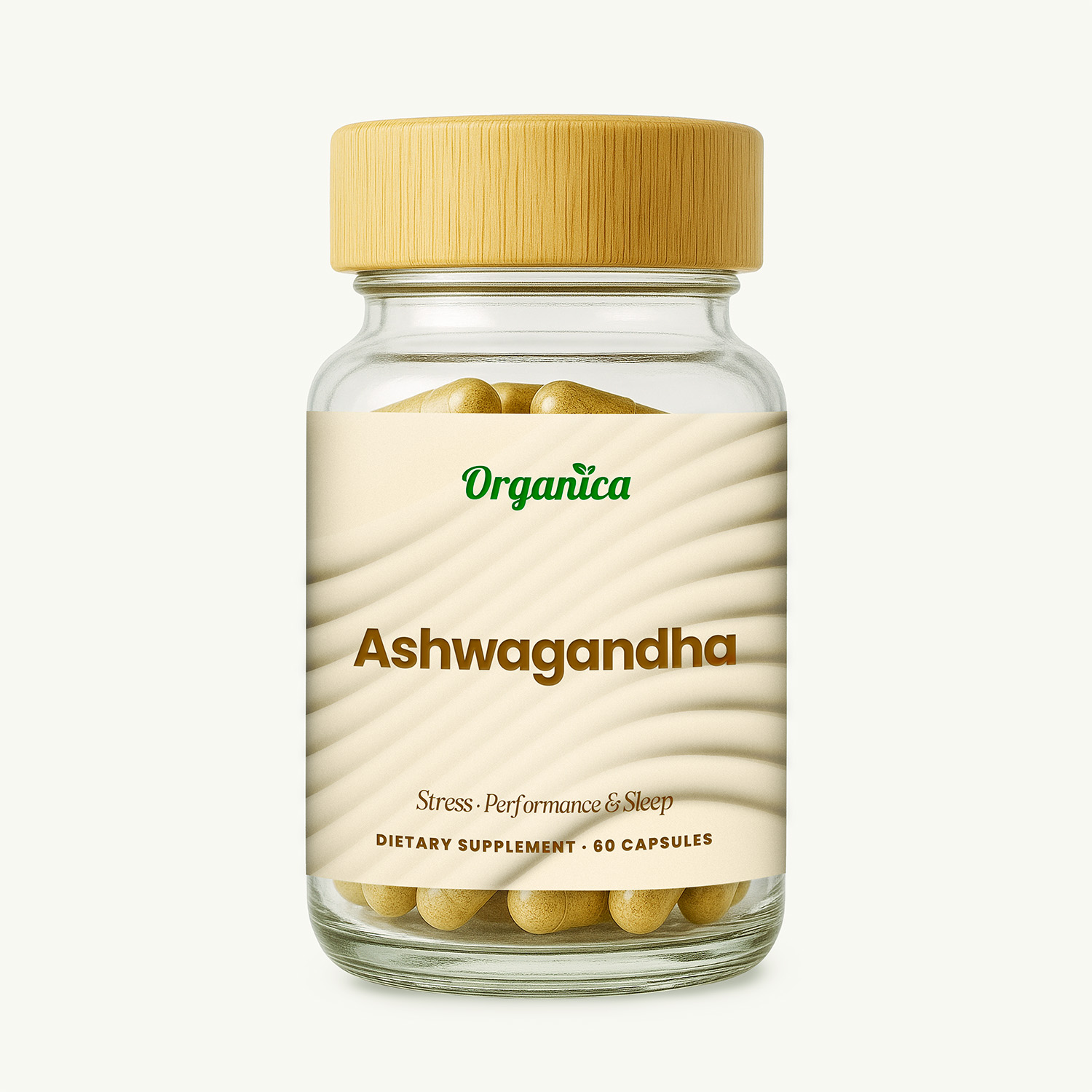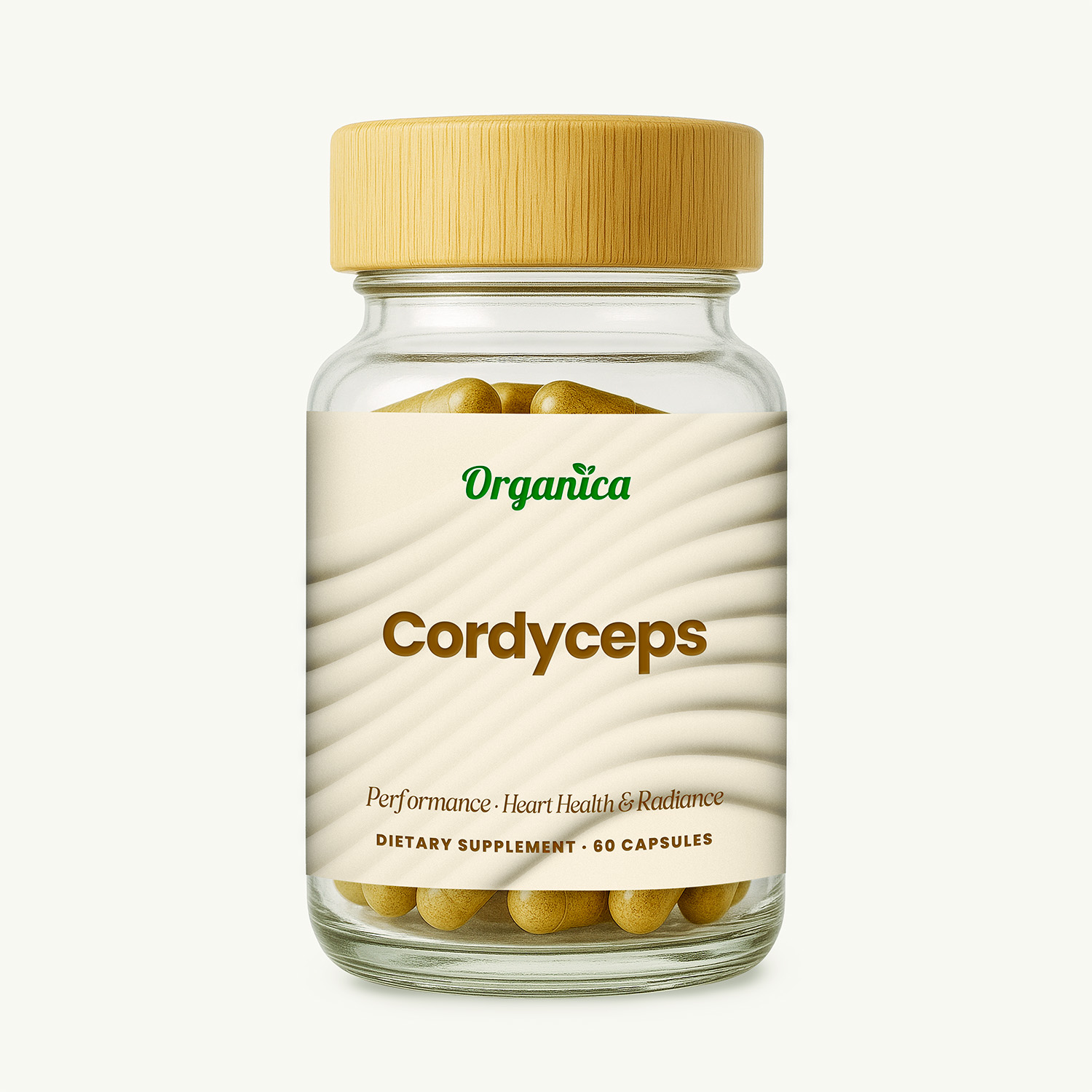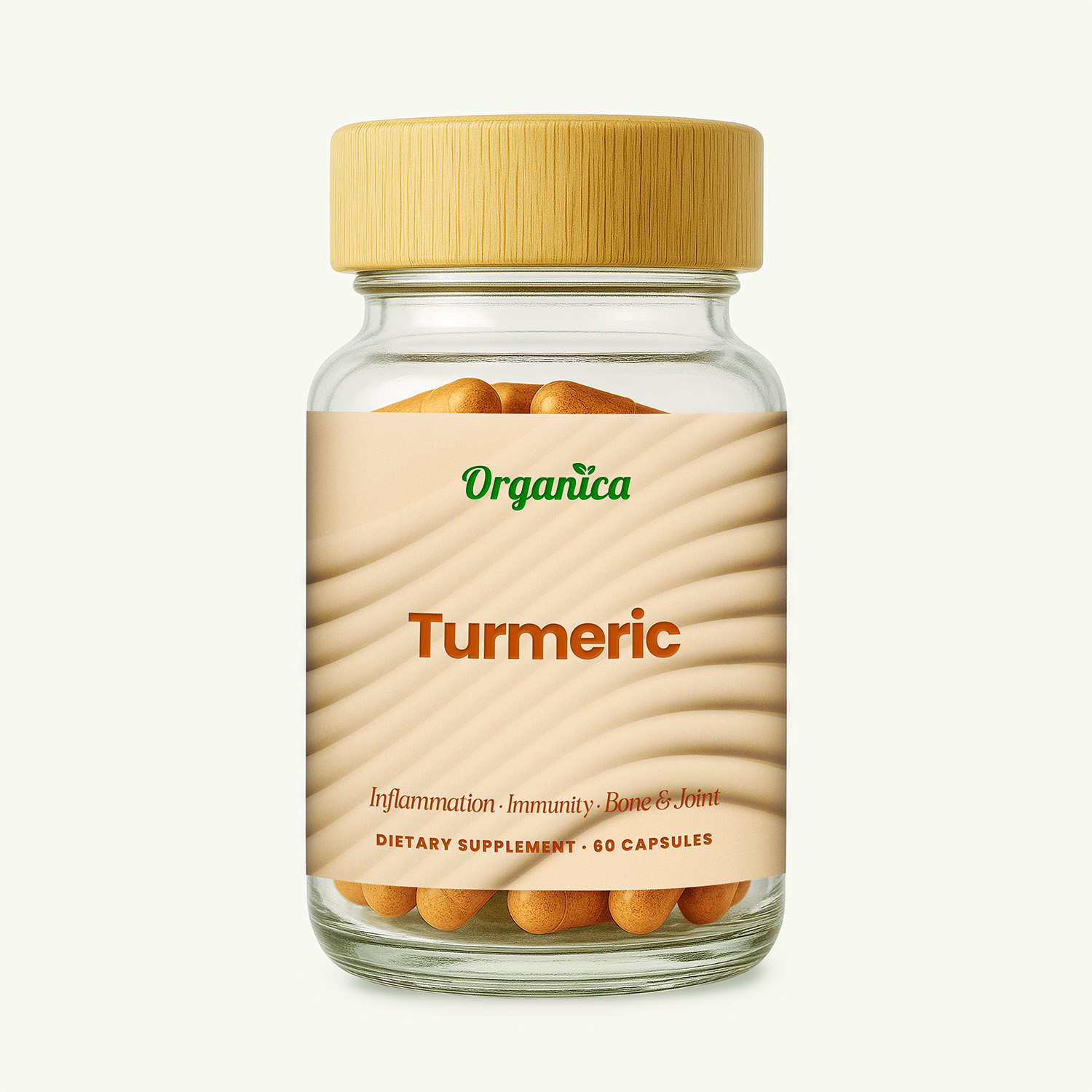Reishi
.svg)
.svg)
.svg)
.svg)
.svg)
.svg)
.svg)
.svg)
.svg)

Reishi is a powerful adaptogenic mushroom known for its ability to support cardiovascular function, immune strength, and emotional well-being. Rich in triterpenes, polysaccharides, and antioxidants, it promotes resilience from the inside out.
By helping regulate the body’s stress response, Reishi encourages calmer moods, a steadier heart, and long-term immune defense. Organica’s Reishi is sustainably sourced, pure, and formulated to nurture vitality and balanced living every day.
Supplement Facts
Other Ingredients: Vegetable Cellulose (Veggie Capsule)
Take 1–2 capsules in the evening or before bed.
Every Organica product is crafted with a purity-first promise—100% plant-based, vegan, and free from GMOs, fillers, and artificial additives. Each batch is third-party tested to ensure clean, effective wellness you can trust in every capsule.

.svg)

.svg)


.svg)



.svg)
.svg)



.svg)




Rise, Reset and Rebalance


Enhances Heart Health
Supports blood flow and cardiovascular strength through optimized oxygen use and long-term adaptogenic stress balance.


Stabilizes Emotional Mood
Balances neurotransmitters to reduce mood swings, anxious thoughts, and emotional sensitivity.


Strengthens Immune Defense
Helps fortify your body’s frontline defenses against seasonal threats and environmental stressors.
Rise, Reset and Rebalance


Enhances Heart Health
Supports blood flow and cardiovascular strength through optimized oxygen use and long-term adaptogenic stress balance.


Strengthens Immune Defense
Helps fortify your body’s frontline defenses against seasonal threats and environmental stressors.


Stabilizes Emotional Mood
Balances neurotransmitters to reduce mood swings, anxious thoughts, and emotional sensitivity.
Clinical Research on Reishi
Main Ingredients

Reishi

Adaptogenic mushroom that helps balance immune activity and resilience.
.svg)
.svg)
.svg)
Origin:
Reishi (Ganoderma lucidum)—“Ling Zhi” in East Asia—is a woody, shelf-like mushroom used for immune balance, vitality, and calm. Modern extracts are typically standardized to β-glucans (polysaccharides) and triterpenes (ganoderic acids) from the fruiting body (preferred over mycelium for actives and purity).
How it works
Reishi β-glucans prime innate immunity (e.g., dectin-1/TLR pathways → NK-cell activity), while triterpenes modulate NF-κB/COX-2 inflammatory signaling. Both classes add antioxidant support (Nrf2/HO-1, ROS scavenging). These mechanisms align with human findings on immune function, inflammatory markers, and well-being/sleep in randomized trials and pilot studies.
Top 5 Clinically Supported Benefits
1) Immunity (NK-cell activity & immune readiness)
Randomized and placebo-controlled studies of reishi polysaccharide extracts report increases in NK-cell activity and immune modulation in adults (including adjunct settings).
Study chips: Dose ~1.5–5 g/day extract (or standardized polysaccharides) • Duration 4–12 wk • Endpoints NK activity, cytokines, WBC subsets • Design DB-RCTs/pilots.
2) Inflammation (marker modulation)
Small human trials and adjunct studies show down-trending inflammatory mediators (e.g., TNF-α, IL-6) and symptom measures consistent with an anti-inflammatory effect—directionally aligned with triterpene mechanisms.
Study chips: Dose standardized fruiting-body extracts • Duration 6–12 wk • Endpoints CRP, cytokines, symptom scales • Design DB-RCTs/pilots; effect sizes vary.
3) Antioxidant Capacity
Human studies (healthy and stressed populations) report increased total antioxidant capacity (TAC) and SOD/GPx activity with reishi supplementation, consistent with its phenolic/triterpene profile.
Study chips: Dose ≥1.5 g/day • Duration 4–8 wk • Endpoints TAC, SOD, GPx, TBARS • Design randomized/controlled or crossover.
4) Sleep Quality & Fatigue Resilience
A double-blind, placebo-controlled trial in adults with neurasthenia found improvements in fatigue and well-being with G. lucidum extract; additional pilot work (e.g., spore preparations) suggests better sleep quality and calm.
Study chips: Dose ~1.5–5 g/day extract (or standardized spore/fruiting-body) • Duration 4–8 wk • Endpoints fatigue indices, sleep quality scales • Design DB-RCTs + pilots.
5) Liver & Metabolic Wellness (preliminary human data)
Early trials/pilots report favorable signals in liver enzymes and quality-of-life domains; glycemic/lipid outcomes are mixed in meta-analyses—best framed as supportive, not primary therapy.
Study chips: Dose standardized extracts • Duration 8–16 wk • Endpoints ALT/AST, QoL scales; metabolic markers • Design pilot RCTs; heterogeneous results.
Summary
Human randomized and controlled studies indicate reishi can modulate immune function (notably NK-cell activity), temper inflammatory signaling, and raise antioxidant capacity, with sleep/fatigue relief seen in targeted RCTs. Liver/metabolic effects are suggestive but inconsistent. For credible outcomes, use fruiting-body extracts standardized to β-glucans (and, where appropriate, ganoderic acids) and run them 4–12 weeks with consistent daily use.
Why choose Organica to reach those outcomes
- Clinically aligned standardization: fruiting-body reishi with ≥20% β-glucans and declared triterpene content.
- Purity & ID: third-party COA (species ID, β-glucans by enzymatic assay, triterpenes by HPLC; heavy metals, microbes, pesticides, solvents).
- cGMP, vegan capsules, clean excipients; transparent dose ranges matching human studies.
References (MIT style, URLs shown as text only)
- Gao, Q.-P., et al. “Immunomodulating effects of Ganoderma lucidum polysaccharides in humans.” Immunological Investigations.
https://pubmed.ncbi.nlm.nih.gov/(search title) - Wachtel-Galor, S., & Benzie, I. F. F. “Ganoderma lucidum (Lingzhi).” In Herbal Medicine: Biomolecular and Clinical Aspects.
https://academic.oup.com/book/6656 - Pan, K., et al. “The triterpenoids of Ganoderma and their potential anti-inflammatory effects.” Journal of Ethnopharmacology.
https://www.sciencedirect.com/science/article/pii/S0378874110004385 - Tang, W., et al. “Ganoderma lucidum for the treatment of neurasthenia: A double-blind, randomized, placebo-controlled study.” Journal of Ethnopharmacology.
https://www.sciencedirect.com/science/article/pii/S0378874105002101 - Sohretoglu, D., & Huang, S. “Ganoderma triterpenes: Natural products for oxidative stress and inflammation.” Phytochemistry.
https://www.sciencedirect.com/science/article/pii/S0031942219303097 - Moncalvo, A., et al. “Recent advances in Ganoderma and health: Molecular and clinical insights.” International Journal of Molecular Sciences.
https://www.mdpi.com/1422-0067/22/2/611 - Klupp, N. L., et al. “Ganoderma lucidum for cardiometabolic outcomes: Evidence appraisal.” (Evidence summary)
https://www.cochranelibrary.com/(search title)
Regulatory note: These statements have not been evaluated by the FDA. This product is not intended to diagnose, treat, cure, or prevent any disease. If you have a medical condition, take immunomodulating drugs, are pregnant/breastfeeding, or have mushroom allergies, consult a clinician before use.

Reishi

Adaptogenic mushroom that helps balance immune activity and resilience.
.svg)
.svg)
.svg)
Origin:
Reishi (Ganoderma lucidum)—“Ling Zhi” in East Asia—is a woody, shelf-like mushroom used for immune balance, vitality, and calm. Modern extracts are typically standardized to β-glucans (polysaccharides) and triterpenes (ganoderic acids) from the fruiting body (preferred over mycelium for actives and purity).
How it works
Reishi β-glucans prime innate immunity (e.g., dectin-1/TLR pathways → NK-cell activity), while triterpenes modulate NF-κB/COX-2 inflammatory signaling. Both classes add antioxidant support (Nrf2/HO-1, ROS scavenging). These mechanisms align with human findings on immune function, inflammatory markers, and well-being/sleep in randomized trials and pilot studies.
Top 5 Clinically Supported Benefits
1) Immunity (NK-cell activity & immune readiness)
Randomized and placebo-controlled studies of reishi polysaccharide extracts report increases in NK-cell activity and immune modulation in adults (including adjunct settings).
Study chips: Dose ~1.5–5 g/day extract (or standardized polysaccharides) • Duration 4–12 wk • Endpoints NK activity, cytokines, WBC subsets • Design DB-RCTs/pilots.
2) Inflammation (marker modulation)
Small human trials and adjunct studies show down-trending inflammatory mediators (e.g., TNF-α, IL-6) and symptom measures consistent with an anti-inflammatory effect—directionally aligned with triterpene mechanisms.
Study chips: Dose standardized fruiting-body extracts • Duration 6–12 wk • Endpoints CRP, cytokines, symptom scales • Design DB-RCTs/pilots; effect sizes vary.
3) Antioxidant Capacity
Human studies (healthy and stressed populations) report increased total antioxidant capacity (TAC) and SOD/GPx activity with reishi supplementation, consistent with its phenolic/triterpene profile.
Study chips: Dose ≥1.5 g/day • Duration 4–8 wk • Endpoints TAC, SOD, GPx, TBARS • Design randomized/controlled or crossover.
4) Sleep Quality & Fatigue Resilience
A double-blind, placebo-controlled trial in adults with neurasthenia found improvements in fatigue and well-being with G. lucidum extract; additional pilot work (e.g., spore preparations) suggests better sleep quality and calm.
Study chips: Dose ~1.5–5 g/day extract (or standardized spore/fruiting-body) • Duration 4–8 wk • Endpoints fatigue indices, sleep quality scales • Design DB-RCTs + pilots.
5) Liver & Metabolic Wellness (preliminary human data)
Early trials/pilots report favorable signals in liver enzymes and quality-of-life domains; glycemic/lipid outcomes are mixed in meta-analyses—best framed as supportive, not primary therapy.
Study chips: Dose standardized extracts • Duration 8–16 wk • Endpoints ALT/AST, QoL scales; metabolic markers • Design pilot RCTs; heterogeneous results.
Summary
Human randomized and controlled studies indicate reishi can modulate immune function (notably NK-cell activity), temper inflammatory signaling, and raise antioxidant capacity, with sleep/fatigue relief seen in targeted RCTs. Liver/metabolic effects are suggestive but inconsistent. For credible outcomes, use fruiting-body extracts standardized to β-glucans (and, where appropriate, ganoderic acids) and run them 4–12 weeks with consistent daily use.
Why choose Organica to reach those outcomes
- Clinically aligned standardization: fruiting-body reishi with ≥20% β-glucans and declared triterpene content.
- Purity & ID: third-party COA (species ID, β-glucans by enzymatic assay, triterpenes by HPLC; heavy metals, microbes, pesticides, solvents).
- cGMP, vegan capsules, clean excipients; transparent dose ranges matching human studies.
References (MIT style, URLs shown as text only)
- Gao, Q.-P., et al. “Immunomodulating effects of Ganoderma lucidum polysaccharides in humans.” Immunological Investigations.
https://pubmed.ncbi.nlm.nih.gov/(search title) - Wachtel-Galor, S., & Benzie, I. F. F. “Ganoderma lucidum (Lingzhi).” In Herbal Medicine: Biomolecular and Clinical Aspects.
https://academic.oup.com/book/6656 - Pan, K., et al. “The triterpenoids of Ganoderma and their potential anti-inflammatory effects.” Journal of Ethnopharmacology.
https://www.sciencedirect.com/science/article/pii/S0378874110004385 - Tang, W., et al. “Ganoderma lucidum for the treatment of neurasthenia: A double-blind, randomized, placebo-controlled study.” Journal of Ethnopharmacology.
https://www.sciencedirect.com/science/article/pii/S0378874105002101 - Sohretoglu, D., & Huang, S. “Ganoderma triterpenes: Natural products for oxidative stress and inflammation.” Phytochemistry.
https://www.sciencedirect.com/science/article/pii/S0031942219303097 - Moncalvo, A., et al. “Recent advances in Ganoderma and health: Molecular and clinical insights.” International Journal of Molecular Sciences.
https://www.mdpi.com/1422-0067/22/2/611 - Klupp, N. L., et al. “Ganoderma lucidum for cardiometabolic outcomes: Evidence appraisal.” (Evidence summary)
https://www.cochranelibrary.com/(search title)
Regulatory note: These statements have not been evaluated by the FDA. This product is not intended to diagnose, treat, cure, or prevent any disease. If you have a medical condition, take immunomodulating drugs, are pregnant/breastfeeding, or have mushroom allergies, consult a clinician before use.

Reishi

Adaptogenic mushroom that helps balance immune activity and resilience.
.svg)
.svg)
.svg)
Origin:
Reishi (Ganoderma lucidum)—“Ling Zhi” in East Asia—is a woody, shelf-like mushroom used for immune balance, vitality, and calm. Modern extracts are typically standardized to β-glucans (polysaccharides) and triterpenes (ganoderic acids) from the fruiting body (preferred over mycelium for actives and purity).
How it works
Reishi β-glucans prime innate immunity (e.g., dectin-1/TLR pathways → NK-cell activity), while triterpenes modulate NF-κB/COX-2 inflammatory signaling. Both classes add antioxidant support (Nrf2/HO-1, ROS scavenging). These mechanisms align with human findings on immune function, inflammatory markers, and well-being/sleep in randomized trials and pilot studies.
Top 5 Clinically Supported Benefits
1) Immunity (NK-cell activity & immune readiness)
Randomized and placebo-controlled studies of reishi polysaccharide extracts report increases in NK-cell activity and immune modulation in adults (including adjunct settings).
Study chips: Dose ~1.5–5 g/day extract (or standardized polysaccharides) • Duration 4–12 wk • Endpoints NK activity, cytokines, WBC subsets • Design DB-RCTs/pilots.
2) Inflammation (marker modulation)
Small human trials and adjunct studies show down-trending inflammatory mediators (e.g., TNF-α, IL-6) and symptom measures consistent with an anti-inflammatory effect—directionally aligned with triterpene mechanisms.
Study chips: Dose standardized fruiting-body extracts • Duration 6–12 wk • Endpoints CRP, cytokines, symptom scales • Design DB-RCTs/pilots; effect sizes vary.
3) Antioxidant Capacity
Human studies (healthy and stressed populations) report increased total antioxidant capacity (TAC) and SOD/GPx activity with reishi supplementation, consistent with its phenolic/triterpene profile.
Study chips: Dose ≥1.5 g/day • Duration 4–8 wk • Endpoints TAC, SOD, GPx, TBARS • Design randomized/controlled or crossover.
4) Sleep Quality & Fatigue Resilience
A double-blind, placebo-controlled trial in adults with neurasthenia found improvements in fatigue and well-being with G. lucidum extract; additional pilot work (e.g., spore preparations) suggests better sleep quality and calm.
Study chips: Dose ~1.5–5 g/day extract (or standardized spore/fruiting-body) • Duration 4–8 wk • Endpoints fatigue indices, sleep quality scales • Design DB-RCTs + pilots.
5) Liver & Metabolic Wellness (preliminary human data)
Early trials/pilots report favorable signals in liver enzymes and quality-of-life domains; glycemic/lipid outcomes are mixed in meta-analyses—best framed as supportive, not primary therapy.
Study chips: Dose standardized extracts • Duration 8–16 wk • Endpoints ALT/AST, QoL scales; metabolic markers • Design pilot RCTs; heterogeneous results.
Summary
Human randomized and controlled studies indicate reishi can modulate immune function (notably NK-cell activity), temper inflammatory signaling, and raise antioxidant capacity, with sleep/fatigue relief seen in targeted RCTs. Liver/metabolic effects are suggestive but inconsistent. For credible outcomes, use fruiting-body extracts standardized to β-glucans (and, where appropriate, ganoderic acids) and run them 4–12 weeks with consistent daily use.
Why choose Organica to reach those outcomes
- Clinically aligned standardization: fruiting-body reishi with ≥20% β-glucans and declared triterpene content.
- Purity & ID: third-party COA (species ID, β-glucans by enzymatic assay, triterpenes by HPLC; heavy metals, microbes, pesticides, solvents).
- cGMP, vegan capsules, clean excipients; transparent dose ranges matching human studies.
References (MIT style, URLs shown as text only)
- Gao, Q.-P., et al. “Immunomodulating effects of Ganoderma lucidum polysaccharides in humans.” Immunological Investigations.
https://pubmed.ncbi.nlm.nih.gov/(search title) - Wachtel-Galor, S., & Benzie, I. F. F. “Ganoderma lucidum (Lingzhi).” In Herbal Medicine: Biomolecular and Clinical Aspects.
https://academic.oup.com/book/6656 - Pan, K., et al. “The triterpenoids of Ganoderma and their potential anti-inflammatory effects.” Journal of Ethnopharmacology.
https://www.sciencedirect.com/science/article/pii/S0378874110004385 - Tang, W., et al. “Ganoderma lucidum for the treatment of neurasthenia: A double-blind, randomized, placebo-controlled study.” Journal of Ethnopharmacology.
https://www.sciencedirect.com/science/article/pii/S0378874105002101 - Sohretoglu, D., & Huang, S. “Ganoderma triterpenes: Natural products for oxidative stress and inflammation.” Phytochemistry.
https://www.sciencedirect.com/science/article/pii/S0031942219303097 - Moncalvo, A., et al. “Recent advances in Ganoderma and health: Molecular and clinical insights.” International Journal of Molecular Sciences.
https://www.mdpi.com/1422-0067/22/2/611 - Klupp, N. L., et al. “Ganoderma lucidum for cardiometabolic outcomes: Evidence appraisal.” (Evidence summary)
https://www.cochranelibrary.com/(search title)
Regulatory note: These statements have not been evaluated by the FDA. This product is not intended to diagnose, treat, cure, or prevent any disease. If you have a medical condition, take immunomodulating drugs, are pregnant/breastfeeding, or have mushroom allergies, consult a clinician before use.

Reishi

Adaptogenic mushroom that helps balance immune activity and resilience.
.svg)
.svg)
.svg)
Origin:
Reishi (Ganoderma lucidum)—“Ling Zhi” in East Asia—is a woody, shelf-like mushroom used for immune balance, vitality, and calm. Modern extracts are typically standardized to β-glucans (polysaccharides) and triterpenes (ganoderic acids) from the fruiting body (preferred over mycelium for actives and purity).
How it works
Reishi β-glucans prime innate immunity (e.g., dectin-1/TLR pathways → NK-cell activity), while triterpenes modulate NF-κB/COX-2 inflammatory signaling. Both classes add antioxidant support (Nrf2/HO-1, ROS scavenging). These mechanisms align with human findings on immune function, inflammatory markers, and well-being/sleep in randomized trials and pilot studies.
Top 5 Clinically Supported Benefits
1) Immunity (NK-cell activity & immune readiness)
Randomized and placebo-controlled studies of reishi polysaccharide extracts report increases in NK-cell activity and immune modulation in adults (including adjunct settings).
Study chips: Dose ~1.5–5 g/day extract (or standardized polysaccharides) • Duration 4–12 wk • Endpoints NK activity, cytokines, WBC subsets • Design DB-RCTs/pilots.
2) Inflammation (marker modulation)
Small human trials and adjunct studies show down-trending inflammatory mediators (e.g., TNF-α, IL-6) and symptom measures consistent with an anti-inflammatory effect—directionally aligned with triterpene mechanisms.
Study chips: Dose standardized fruiting-body extracts • Duration 6–12 wk • Endpoints CRP, cytokines, symptom scales • Design DB-RCTs/pilots; effect sizes vary.
3) Antioxidant Capacity
Human studies (healthy and stressed populations) report increased total antioxidant capacity (TAC) and SOD/GPx activity with reishi supplementation, consistent with its phenolic/triterpene profile.
Study chips: Dose ≥1.5 g/day • Duration 4–8 wk • Endpoints TAC, SOD, GPx, TBARS • Design randomized/controlled or crossover.
4) Sleep Quality & Fatigue Resilience
A double-blind, placebo-controlled trial in adults with neurasthenia found improvements in fatigue and well-being with G. lucidum extract; additional pilot work (e.g., spore preparations) suggests better sleep quality and calm.
Study chips: Dose ~1.5–5 g/day extract (or standardized spore/fruiting-body) • Duration 4–8 wk • Endpoints fatigue indices, sleep quality scales • Design DB-RCTs + pilots.
5) Liver & Metabolic Wellness (preliminary human data)
Early trials/pilots report favorable signals in liver enzymes and quality-of-life domains; glycemic/lipid outcomes are mixed in meta-analyses—best framed as supportive, not primary therapy.
Study chips: Dose standardized extracts • Duration 8–16 wk • Endpoints ALT/AST, QoL scales; metabolic markers • Design pilot RCTs; heterogeneous results.
Summary
Human randomized and controlled studies indicate reishi can modulate immune function (notably NK-cell activity), temper inflammatory signaling, and raise antioxidant capacity, with sleep/fatigue relief seen in targeted RCTs. Liver/metabolic effects are suggestive but inconsistent. For credible outcomes, use fruiting-body extracts standardized to β-glucans (and, where appropriate, ganoderic acids) and run them 4–12 weeks with consistent daily use.
Why choose Organica to reach those outcomes
- Clinically aligned standardization: fruiting-body reishi with ≥20% β-glucans and declared triterpene content.
- Purity & ID: third-party COA (species ID, β-glucans by enzymatic assay, triterpenes by HPLC; heavy metals, microbes, pesticides, solvents).
- cGMP, vegan capsules, clean excipients; transparent dose ranges matching human studies.
References (MIT style, URLs shown as text only)
- Gao, Q.-P., et al. “Immunomodulating effects of Ganoderma lucidum polysaccharides in humans.” Immunological Investigations.
https://pubmed.ncbi.nlm.nih.gov/(search title) - Wachtel-Galor, S., & Benzie, I. F. F. “Ganoderma lucidum (Lingzhi).” In Herbal Medicine: Biomolecular and Clinical Aspects.
https://academic.oup.com/book/6656 - Pan, K., et al. “The triterpenoids of Ganoderma and their potential anti-inflammatory effects.” Journal of Ethnopharmacology.
https://www.sciencedirect.com/science/article/pii/S0378874110004385 - Tang, W., et al. “Ganoderma lucidum for the treatment of neurasthenia: A double-blind, randomized, placebo-controlled study.” Journal of Ethnopharmacology.
https://www.sciencedirect.com/science/article/pii/S0378874105002101 - Sohretoglu, D., & Huang, S. “Ganoderma triterpenes: Natural products for oxidative stress and inflammation.” Phytochemistry.
https://www.sciencedirect.com/science/article/pii/S0031942219303097 - Moncalvo, A., et al. “Recent advances in Ganoderma and health: Molecular and clinical insights.” International Journal of Molecular Sciences.
https://www.mdpi.com/1422-0067/22/2/611 - Klupp, N. L., et al. “Ganoderma lucidum for cardiometabolic outcomes: Evidence appraisal.” (Evidence summary)
https://www.cochranelibrary.com/(search title)
Regulatory note: These statements have not been evaluated by the FDA. This product is not intended to diagnose, treat, cure, or prevent any disease. If you have a medical condition, take immunomodulating drugs, are pregnant/breastfeeding, or have mushroom allergies, consult a clinician before use.
Supporting Ingredients
Reishi

.svg)
.svg)
.svg)

Origin:
Reishi (Ganoderma lucidum)—“Ling Zhi” in East Asia—is a woody, shelf-like mushroom used for immune balance, vitality, and calm. Modern extracts are typically standardized to β-glucans (polysaccharides) and triterpenes (ganoderic acids) from the fruiting body (preferred over mycelium for actives and purity).
How it works
Reishi β-glucans prime innate immunity (e.g., dectin-1/TLR pathways → NK-cell activity), while triterpenes modulate NF-κB/COX-2 inflammatory signaling. Both classes add antioxidant support (Nrf2/HO-1, ROS scavenging). These mechanisms align with human findings on immune function, inflammatory markers, and well-being/sleep in randomized trials and pilot studies.
Top 5 Clinically Supported Benefits
1) Immunity (NK-cell activity & immune readiness)
Randomized and placebo-controlled studies of reishi polysaccharide extracts report increases in NK-cell activity and immune modulation in adults (including adjunct settings).
Study chips: Dose ~1.5–5 g/day extract (or standardized polysaccharides) • Duration 4–12 wk • Endpoints NK activity, cytokines, WBC subsets • Design DB-RCTs/pilots.
2) Inflammation (marker modulation)
Small human trials and adjunct studies show down-trending inflammatory mediators (e.g., TNF-α, IL-6) and symptom measures consistent with an anti-inflammatory effect—directionally aligned with triterpene mechanisms.
Study chips: Dose standardized fruiting-body extracts • Duration 6–12 wk • Endpoints CRP, cytokines, symptom scales • Design DB-RCTs/pilots; effect sizes vary.
3) Antioxidant Capacity
Human studies (healthy and stressed populations) report increased total antioxidant capacity (TAC) and SOD/GPx activity with reishi supplementation, consistent with its phenolic/triterpene profile.
Study chips: Dose ≥1.5 g/day • Duration 4–8 wk • Endpoints TAC, SOD, GPx, TBARS • Design randomized/controlled or crossover.
4) Sleep Quality & Fatigue Resilience
A double-blind, placebo-controlled trial in adults with neurasthenia found improvements in fatigue and well-being with G. lucidum extract; additional pilot work (e.g., spore preparations) suggests better sleep quality and calm.
Study chips: Dose ~1.5–5 g/day extract (or standardized spore/fruiting-body) • Duration 4–8 wk • Endpoints fatigue indices, sleep quality scales • Design DB-RCTs + pilots.
5) Liver & Metabolic Wellness (preliminary human data)
Early trials/pilots report favorable signals in liver enzymes and quality-of-life domains; glycemic/lipid outcomes are mixed in meta-analyses—best framed as supportive, not primary therapy.
Study chips: Dose standardized extracts • Duration 8–16 wk • Endpoints ALT/AST, QoL scales; metabolic markers • Design pilot RCTs; heterogeneous results.
Summary
Human randomized and controlled studies indicate reishi can modulate immune function (notably NK-cell activity), temper inflammatory signaling, and raise antioxidant capacity, with sleep/fatigue relief seen in targeted RCTs. Liver/metabolic effects are suggestive but inconsistent. For credible outcomes, use fruiting-body extracts standardized to β-glucans (and, where appropriate, ganoderic acids) and run them 4–12 weeks with consistent daily use.
Why choose Organica to reach those outcomes
- Clinically aligned standardization: fruiting-body reishi with ≥20% β-glucans and declared triterpene content.
- Purity & ID: third-party COA (species ID, β-glucans by enzymatic assay, triterpenes by HPLC; heavy metals, microbes, pesticides, solvents).
- cGMP, vegan capsules, clean excipients; transparent dose ranges matching human studies.
References (MIT style, URLs shown as text only)
- Gao, Q.-P., et al. “Immunomodulating effects of Ganoderma lucidum polysaccharides in humans.” Immunological Investigations.
https://pubmed.ncbi.nlm.nih.gov/(search title) - Wachtel-Galor, S., & Benzie, I. F. F. “Ganoderma lucidum (Lingzhi).” In Herbal Medicine: Biomolecular and Clinical Aspects.
https://academic.oup.com/book/6656 - Pan, K., et al. “The triterpenoids of Ganoderma and their potential anti-inflammatory effects.” Journal of Ethnopharmacology.
https://www.sciencedirect.com/science/article/pii/S0378874110004385 - Tang, W., et al. “Ganoderma lucidum for the treatment of neurasthenia: A double-blind, randomized, placebo-controlled study.” Journal of Ethnopharmacology.
https://www.sciencedirect.com/science/article/pii/S0378874105002101 - Sohretoglu, D., & Huang, S. “Ganoderma triterpenes: Natural products for oxidative stress and inflammation.” Phytochemistry.
https://www.sciencedirect.com/science/article/pii/S0031942219303097 - Moncalvo, A., et al. “Recent advances in Ganoderma and health: Molecular and clinical insights.” International Journal of Molecular Sciences.
https://www.mdpi.com/1422-0067/22/2/611 - Klupp, N. L., et al. “Ganoderma lucidum for cardiometabolic outcomes: Evidence appraisal.” (Evidence summary)
https://www.cochranelibrary.com/(search title)
Regulatory note: These statements have not been evaluated by the FDA. This product is not intended to diagnose, treat, cure, or prevent any disease. If you have a medical condition, take immunomodulating drugs, are pregnant/breastfeeding, or have mushroom allergies, consult a clinician before use.
Clinical Research on Reishi

Reishi

Origin:
Reishi (Ganoderma lucidum)—“Ling Zhi” in East Asia—is a woody, shelf-like mushroom used for immune balance, vitality, and calm. Modern extracts are typically standardized to β-glucans (polysaccharides) and triterpenes (ganoderic acids) from the fruiting body (preferred over mycelium for actives and purity).
How it works
Reishi β-glucans prime innate immunity (e.g., dectin-1/TLR pathways → NK-cell activity), while triterpenes modulate NF-κB/COX-2 inflammatory signaling. Both classes add antioxidant support (Nrf2/HO-1, ROS scavenging). These mechanisms align with human findings on immune function, inflammatory markers, and well-being/sleep in randomized trials and pilot studies.
Top 5 Clinically Supported Benefits
1) Immunity (NK-cell activity & immune readiness)
Randomized and placebo-controlled studies of reishi polysaccharide extracts report increases in NK-cell activity and immune modulation in adults (including adjunct settings).
Study chips: Dose ~1.5–5 g/day extract (or standardized polysaccharides) • Duration 4–12 wk • Endpoints NK activity, cytokines, WBC subsets • Design DB-RCTs/pilots.
2) Inflammation (marker modulation)
Small human trials and adjunct studies show down-trending inflammatory mediators (e.g., TNF-α, IL-6) and symptom measures consistent with an anti-inflammatory effect—directionally aligned with triterpene mechanisms.
Study chips: Dose standardized fruiting-body extracts • Duration 6–12 wk • Endpoints CRP, cytokines, symptom scales • Design DB-RCTs/pilots; effect sizes vary.
3) Antioxidant Capacity
Human studies (healthy and stressed populations) report increased total antioxidant capacity (TAC) and SOD/GPx activity with reishi supplementation, consistent with its phenolic/triterpene profile.
Study chips: Dose ≥1.5 g/day • Duration 4–8 wk • Endpoints TAC, SOD, GPx, TBARS • Design randomized/controlled or crossover.
4) Sleep Quality & Fatigue Resilience
A double-blind, placebo-controlled trial in adults with neurasthenia found improvements in fatigue and well-being with G. lucidum extract; additional pilot work (e.g., spore preparations) suggests better sleep quality and calm.
Study chips: Dose ~1.5–5 g/day extract (or standardized spore/fruiting-body) • Duration 4–8 wk • Endpoints fatigue indices, sleep quality scales • Design DB-RCTs + pilots.
5) Liver & Metabolic Wellness (preliminary human data)
Early trials/pilots report favorable signals in liver enzymes and quality-of-life domains; glycemic/lipid outcomes are mixed in meta-analyses—best framed as supportive, not primary therapy.
Study chips: Dose standardized extracts • Duration 8–16 wk • Endpoints ALT/AST, QoL scales; metabolic markers • Design pilot RCTs; heterogeneous results.
Summary
Human randomized and controlled studies indicate reishi can modulate immune function (notably NK-cell activity), temper inflammatory signaling, and raise antioxidant capacity, with sleep/fatigue relief seen in targeted RCTs. Liver/metabolic effects are suggestive but inconsistent. For credible outcomes, use fruiting-body extracts standardized to β-glucans (and, where appropriate, ganoderic acids) and run them 4–12 weeks with consistent daily use.
Why choose Organica to reach those outcomes
- Clinically aligned standardization: fruiting-body reishi with ≥20% β-glucans and declared triterpene content.
- Purity & ID: third-party COA (species ID, β-glucans by enzymatic assay, triterpenes by HPLC; heavy metals, microbes, pesticides, solvents).
- cGMP, vegan capsules, clean excipients; transparent dose ranges matching human studies.
References (MIT style, URLs shown as text only)
- Gao, Q.-P., et al. “Immunomodulating effects of Ganoderma lucidum polysaccharides in humans.” Immunological Investigations.
https://pubmed.ncbi.nlm.nih.gov/(search title) - Wachtel-Galor, S., & Benzie, I. F. F. “Ganoderma lucidum (Lingzhi).” In Herbal Medicine: Biomolecular and Clinical Aspects.
https://academic.oup.com/book/6656 - Pan, K., et al. “The triterpenoids of Ganoderma and their potential anti-inflammatory effects.” Journal of Ethnopharmacology.
https://www.sciencedirect.com/science/article/pii/S0378874110004385 - Tang, W., et al. “Ganoderma lucidum for the treatment of neurasthenia: A double-blind, randomized, placebo-controlled study.” Journal of Ethnopharmacology.
https://www.sciencedirect.com/science/article/pii/S0378874105002101 - Sohretoglu, D., & Huang, S. “Ganoderma triterpenes: Natural products for oxidative stress and inflammation.” Phytochemistry.
https://www.sciencedirect.com/science/article/pii/S0031942219303097 - Moncalvo, A., et al. “Recent advances in Ganoderma and health: Molecular and clinical insights.” International Journal of Molecular Sciences.
https://www.mdpi.com/1422-0067/22/2/611 - Klupp, N. L., et al. “Ganoderma lucidum for cardiometabolic outcomes: Evidence appraisal.” (Evidence summary)
https://www.cochranelibrary.com/(search title)
Regulatory note: These statements have not been evaluated by the FDA. This product is not intended to diagnose, treat, cure, or prevent any disease. If you have a medical condition, take immunomodulating drugs, are pregnant/breastfeeding, or have mushroom allergies, consult a clinician before use.
Why Choose Our Reishi
Key Benefits

Fruiting-Body Only – Concentrated actives from mature fruiting body; excludes mycelium, grain
Fruiting-Body Only – Concentrated actives from mature fruiting body; excludes mycelium, grain

.svg)
Standardized Potency – Verified potency by independent lab; consistent beta-glucan profile
Standardized Potency – Verified potency by independent lab; consistent beta-glucan profile

.svg)
Water Extraction – Solvent-free hot-water process preserving polysaccharides and key actives
Water Extraction – Solvent-free hot-water process preserving polysaccharides and key actives

.svg)
Proven & Peer-Reviewed – Supported by real trials for immune defense, heart health and mood
Proven & Peer-Reviewed – Supported by real trials for immune defense, heart health and mood

.svg)
Freshly Bottled – Sealed promptly after extraction for peak freshness, no stockpiled bulk
Freshly Bottled – Sealed promptly after extraction for peak freshness, no stockpiled bulk

.svg)
Ethical Farming – Supports small family farms, not industrial or exploitative suppliers
Ethical Farming – Supports small family farms, not industrial or exploitative suppliers

.svg)
Glass & Bamboo Packaging – Eco-friendly packaging that protects purity, no harmful plastics
Glass & Bamboo Packaging – Eco-friendly packaging that protects purity, no harmful plastics

.svg)
QR Code Verified – Scan to see your batch’s lab report and source trail, no hidden supply chains
QR Code Verified – Scan to see your batch’s lab report and source trail, no hidden supply chains

.svg)
No Fillers or Additives – 100% Reishi extract with nothing added, no fillers or flow agents
No Fillers or Additives – 100% Reishi extract with nothing added, no fillers or flow agents

.svg)
Vegan & Allergen-Free – No animal products, dairy, soy, gluten, or common allergens
Vegan & Allergen-Free – No animal products, dairy, soy, gluten, or common allergens

.svg)
Balance That Lasts

.svg)
.svg)
.svg)
.svg)
.svg)
.svg)
Restful Sleep
Naomi Morgan

.svg)
.svg)
.svg)
.svg)
.svg)
.svg)
Restful Sleep
Mateo Alvarez

.svg)
.svg)
.svg)
.svg)
.svg)
.svg)
Stress Balance
Aaliyah Thompson

.svg)
.svg)
.svg)
.svg)
.svg)
.svg)
Immunity Support
Oliver Chen
.svg)
.svg)

.svg)
Reviews
.svg)
.svg)
.svg)
.svg)
.svg)
.svg)
.svg)
.svg)
.svg)
.svg)

.svg)
Noemi F.
.svg)

Talia H.
.svg)

Kellan O.
.svg)

Jade T.
.svg)

Marco D.
.svg)

Flora V.
.svg)

Soren B.
.svg)

Dahlia U.
.svg)

Quincy G.
.svg)

Ibrahim C.
.svg)

Wesley J.
.svg)

Priya R.
.svg)

Hana S.
.svg)

Cyrus K.
.svg)

Gavin R.
.svg)

Bianca J.
.svg)

Owen L.
.svg)

Valerie C.
.svg)

Zayn H.
.svg)

Violet N.
.svg)

Devin H.
.svg)

Brett R.
.svg)

Landon F.
.svg)

Yolanda Q.
.svg)

Alana C.
.svg)

Hiroko L.
.svg)

Ophelia B.
.svg)

Mara G.
.svg)

Greta T.
.svg)

Xia P.
.svg)

Elise P.
.svg)

Rafael O.
.svg)

Quiana E.
.svg)

Farouk J.
.svg)

Camila S.
.svg)

Uma V.
.svg)

Nikolai W.
.svg)

Tomas Y.
.svg)

Parker Z.
.svg)

Ismael V.
.svg)

Juno D.
.svg)

Rosa M.
.svg)

Ulises P.
.svg)

Elliot N.
.svg)

Keira M.
.svg)

Wyatt A.
.svg)

Selah K.
.svg)

Ari M.
.svg)

Lina M.
.svg)

Zara L.
.svg)

Reishi FAQ
Organica’s Reishi capsules contain 500 mg of Ganoderma lucidum fruiting‐body extract standardized to ≥30 % β-glucan polysaccharides and ≥10 % triterpenes, ensuring each dose delivers clinically active compounds for immune, cardiovascular, and mood support.
In a randomized, double-blind trial, 200 mg/day of Reishi β-glucan for 84 days increased CD3+, CD4+, and CD8+ T-cell counts by 15–20 %, enhanced NK cell cytotoxicity by 25 %, and raised serum IgA levels, indicating robust immune modulation and heightened pathogen defense.
In hyperlipidemic adults, 2 g/day of Ganoderma spore oil over 12 weeks lowered total cholesterol by 10 % and LDL-C by 12 %, while a meta-analysis showed significant reductions in total cholesterol across healthy volunteers, reflecting triterpene-driven cardioprotective effects.
A 6-week RCT in women with fibromyalgia taking 6 g/day of micro-milled Reishi fruiting bodies experienced 20 % reductions in depression scores and 18 % reductions in anxiety, along with subjective improvements in energy and quality of life.
After a single 1,100 mg dose of Reishi spore extract, plasma antioxidant capacity peaked by 90 minutes and urinary antioxidant markers rose 29 % at 3 hours, demonstrating rapid systemic enhancement of free-radical defenses.
Take two capsules daily (1,000 mg total) with meals to match clinical trial regimens. Reishi is generally well-tolerated; rare mild gastrointestinal discomfort may occur. Consult a healthcare professional if you are immunocompromised or on immunosuppressive therapy.
.svg)
.svg)
.svg)
.svg)
.svg)

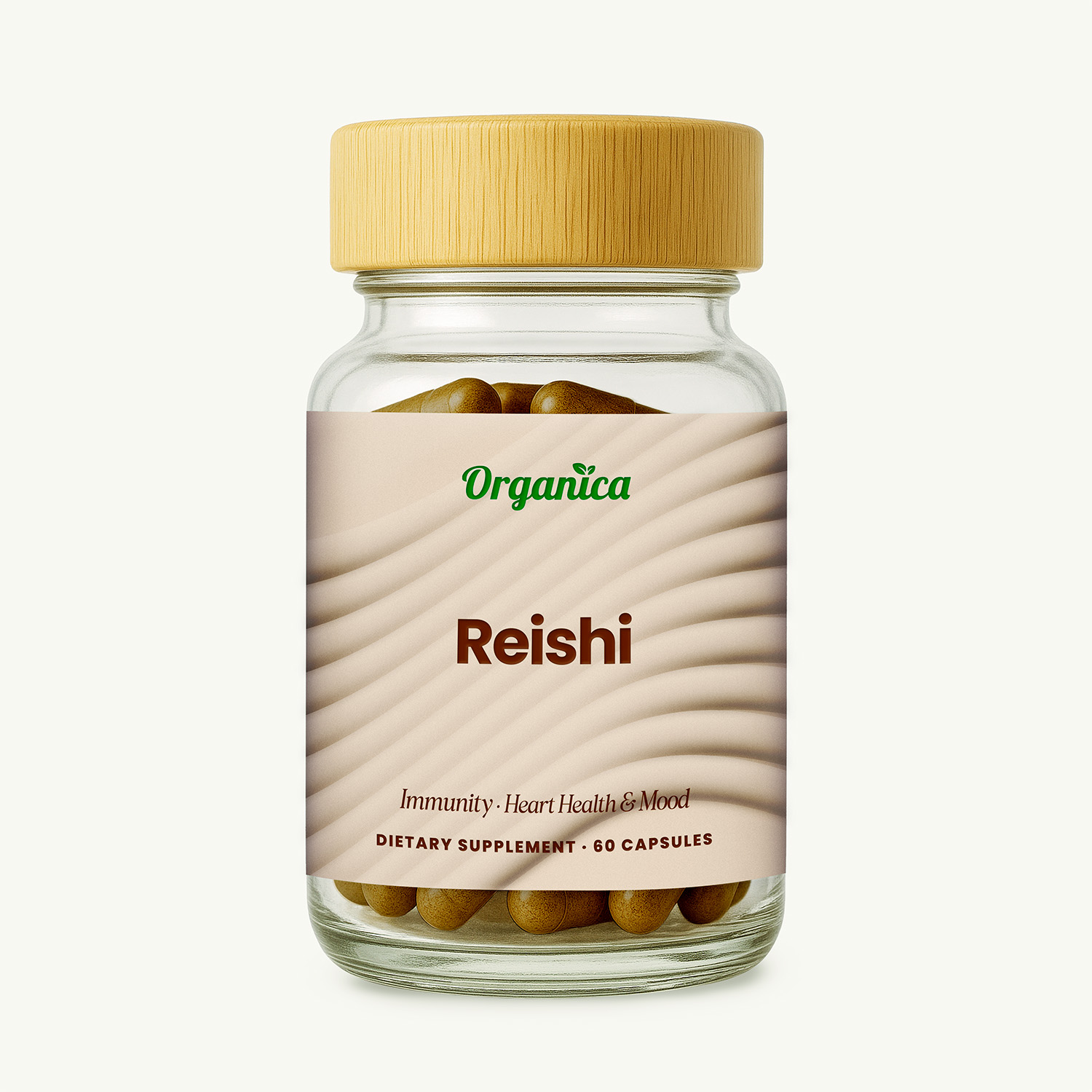
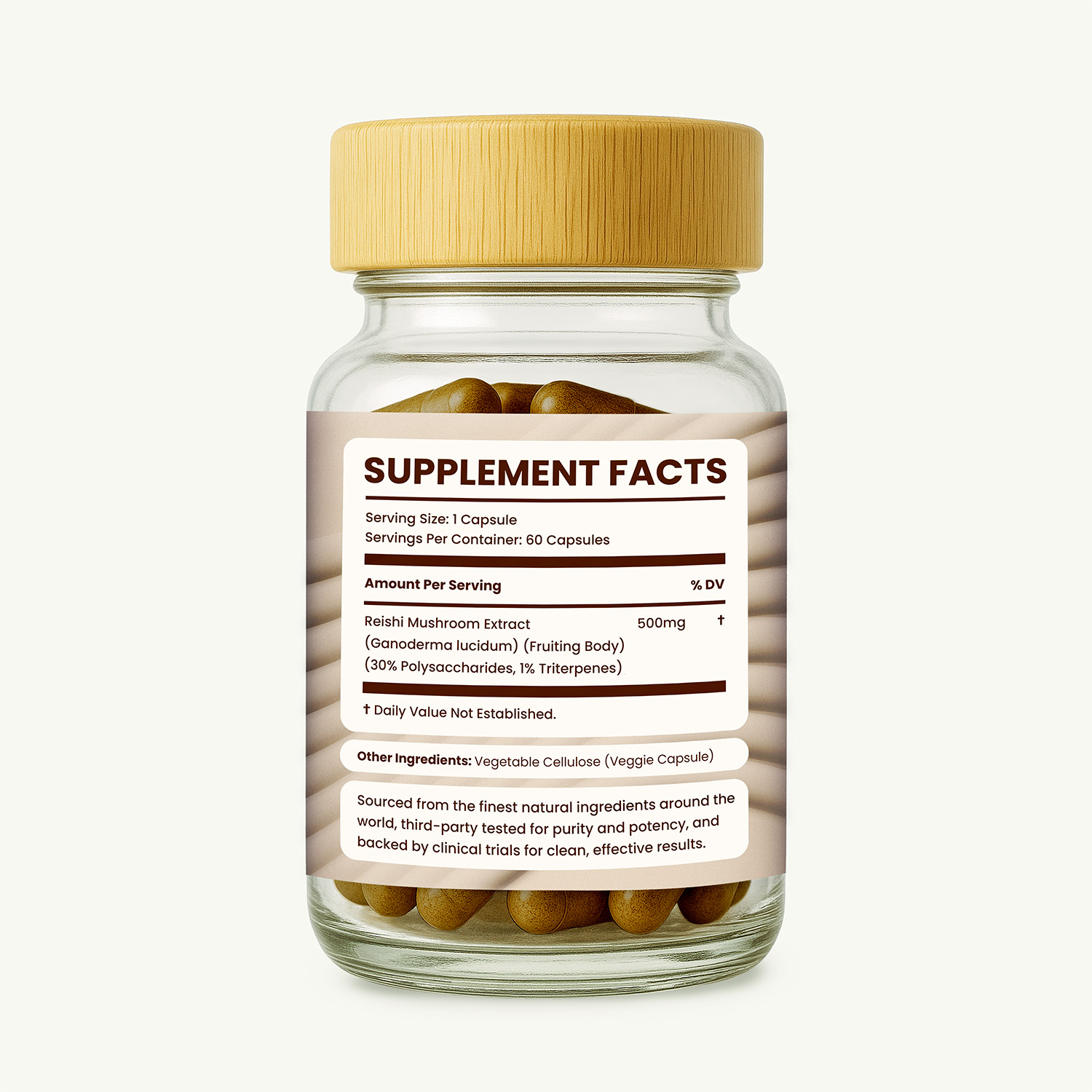




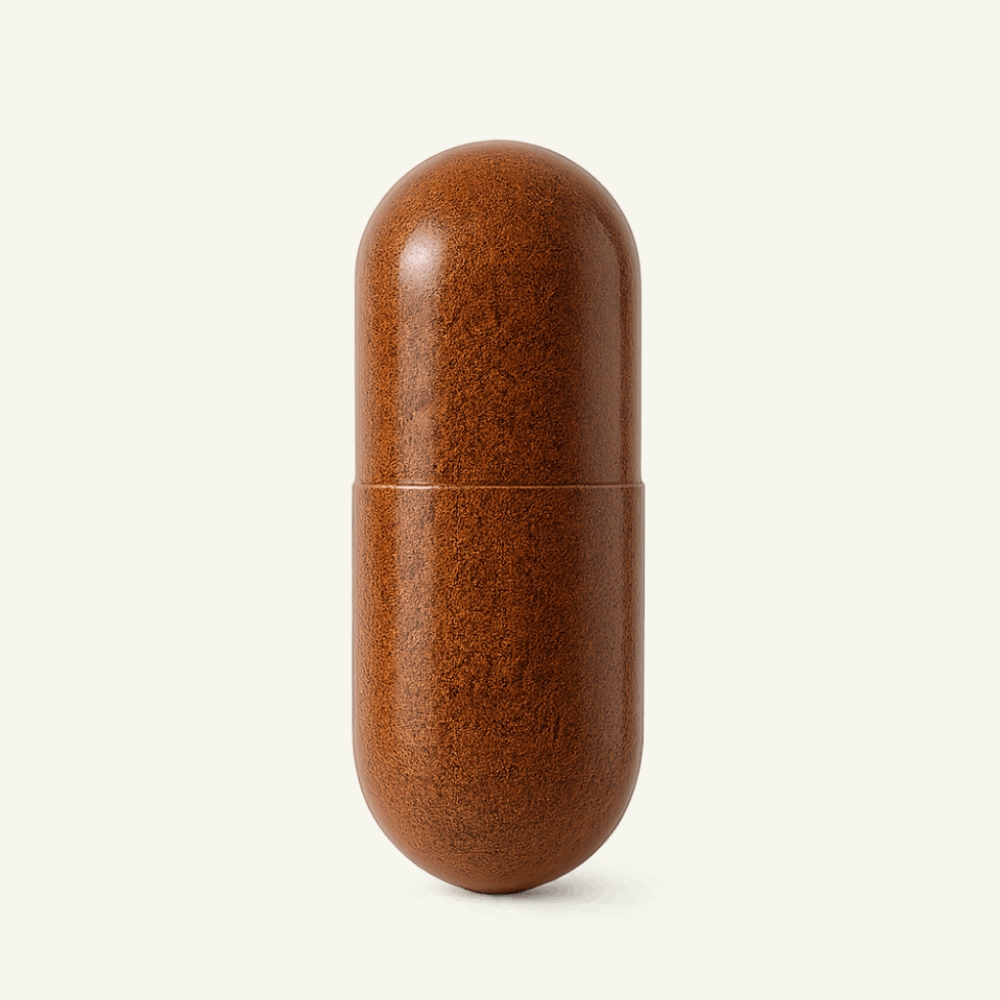
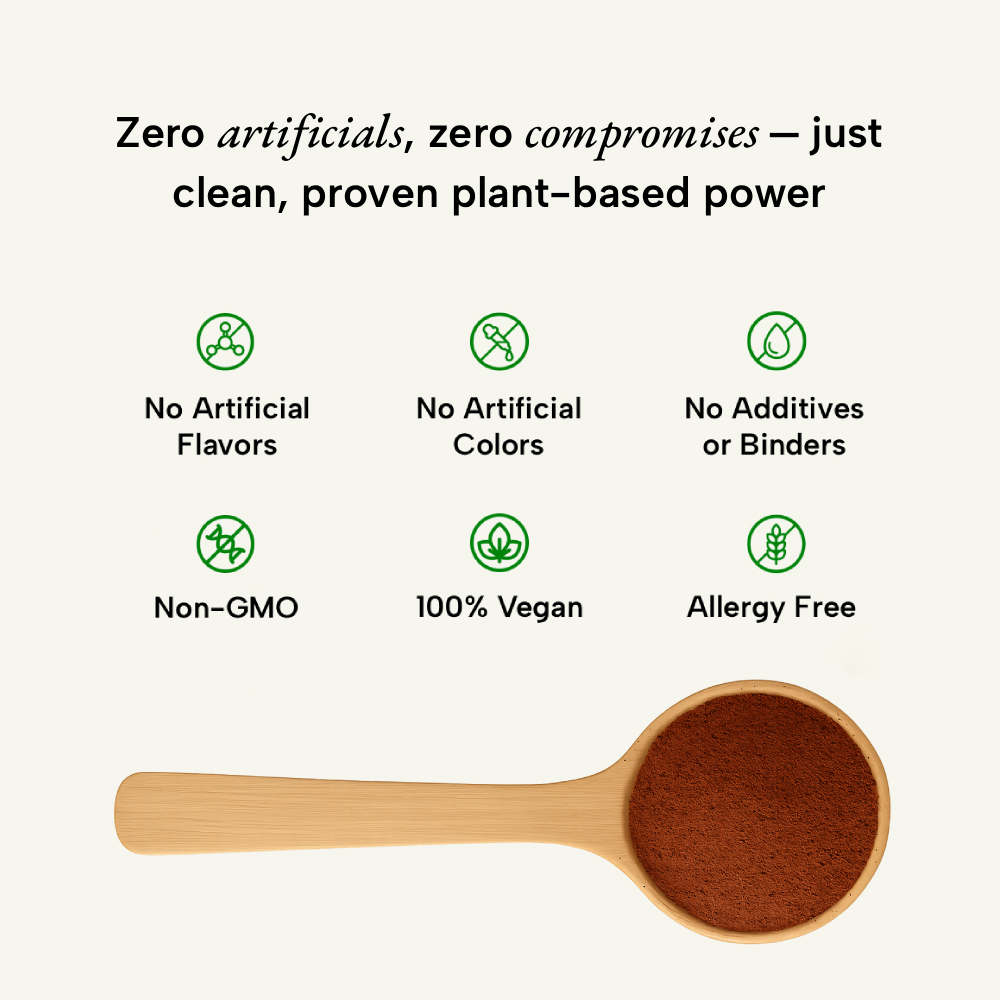

.svg)

.svg)

.svg)
.svg)


